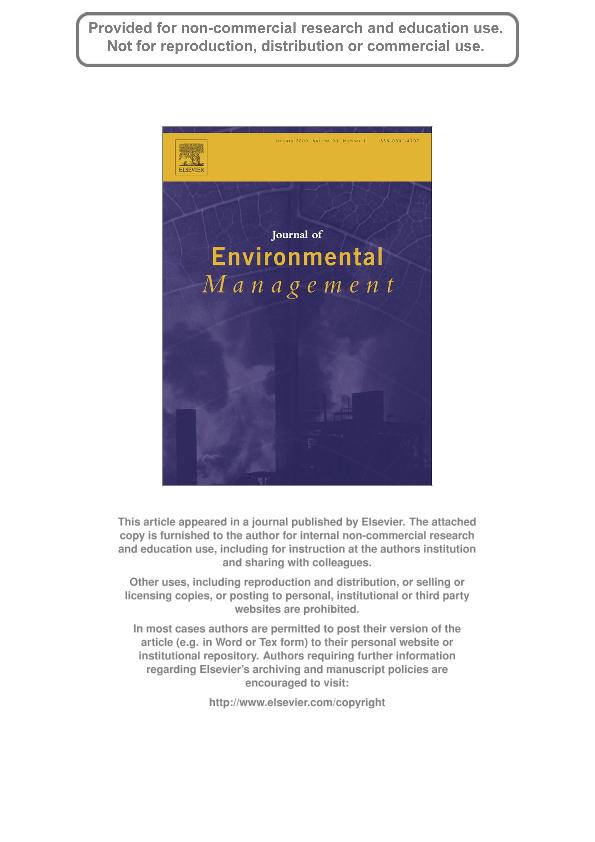Mostrar el registro sencillo del ítem
dc.contributor.author
Maine, Maria Alejandra

dc.contributor.author
Suñe, N.
dc.contributor.author
Hadad, Hernán Ricardo

dc.contributor.author
Sanchez, Gabriela Cristina

dc.contributor.author
Bonetto, Carlos Alberto

dc.date.available
2017-10-02T13:48:27Z
dc.date.issued
2009-02
dc.identifier.citation
Maine, Maria Alejandra; Suñe, N.; Hadad, Hernán Ricardo; Sanchez, Gabriela Cristina; Bonetto, Carlos Alberto; Influence of vegetation on the removal of heavy metals and nutrients in a constructed wetland; Elsevier; Journal of Environmental Management; 90; 1; 2-2009; 355-363
dc.identifier.issn
0301-4797
dc.identifier.uri
http://hdl.handle.net/11336/25537
dc.description.abstract
A free water surface wetland was built to treat wastewater containing metals (Cr, Ni, Zn) and nutrients from a tool factory in Argentina. Water, sediment and macrophytes were sampled in the inlet and outlet area of the constructed wetland during three years. Three successive phases of vegetation dominance were developed and three different patterns of contaminant retention were observed. During the Eichhornia crassipes dominance, contaminants were retained in the macrophyte biomass; during the E. crassipes + Typha domingensis stage, contaminants were retained in the sediment and in the T. domingensis dominance stage, contaminants were retained in sediment and in the macrophyte biomass. Removal efficiency was not significantly different among the three vegetation stages, except for NH4+ and i-Pdiss. Because of its highest tolerance, T. domingensis is the best choice to treat wastewater of high pH and conductivity with heavy metals, a common result from many industrial processes.
dc.format
application/pdf
dc.language.iso
eng
dc.publisher
Elsevier

dc.rights
info:eu-repo/semantics/openAccess
dc.rights.uri
https://creativecommons.org/licenses/by-nc-sa/2.5/ar/
dc.subject
Free-Water Surface Constructed Wetland
dc.subject
Removal Efficiency
dc.subject
Macrophyte
dc.subject
Metallurgic Factory
dc.subject
Effluent Treatment
dc.subject.classification
Oceanografía, Hidrología, Recursos Hídricos

dc.subject.classification
Ciencias de la Tierra y relacionadas con el Medio Ambiente

dc.subject.classification
CIENCIAS NATURALES Y EXACTAS

dc.title
Influence of vegetation on the removal of heavy metals and nutrients in a constructed wetland
dc.type
info:eu-repo/semantics/article
dc.type
info:ar-repo/semantics/artículo
dc.type
info:eu-repo/semantics/publishedVersion
dc.date.updated
2017-09-26T18:59:52Z
dc.journal.volume
90
dc.journal.number
1
dc.journal.pagination
355-363
dc.journal.pais
Países Bajos

dc.journal.ciudad
Amsterdam
dc.description.fil
Fil: Maine, Maria Alejandra. Universidad Nacional del Litoral. Facultad de Ingeniería Química; Argentina. Consejo Nacional de Investigaciones Científicas y Técnicas; Argentina
dc.description.fil
Fil: Suñe, N.. Universidad Nacional del Litoral. Facultad de Ingeniería Química; Argentina
dc.description.fil
Fil: Hadad, Hernán Ricardo. Universidad Nacional del Litoral. Facultad de Ingeniería Química; Argentina. Consejo Nacional de Investigaciones Científicas y Técnicas; Argentina
dc.description.fil
Fil: Sanchez, Gabriela Cristina. Universidad Nacional del Litoral. Facultad de Ingeniería Química; Argentina
dc.description.fil
Fil: Bonetto, Carlos Alberto. Consejo Nacional de Investigaciones Científicas y Técnicas. Centro Científico Tecnológico Conicet - La Plata. Instituto de Limnología "Dr. Raúl A. Ringuelet". Universidad Nacional de La Plata. Facultad de Ciencias Naturales y Museo. Instituto de Limnología; Argentina
dc.journal.title
Journal of Environmental Management

dc.relation.alternativeid
info:eu-repo/semantics/altIdentifier/url/http://www.sciencedirect.com/science/article/pii/S0301479707003635
dc.relation.alternativeid
info:eu-repo/semantics/altIdentifier/doi/http://dx.doi.org/10.1016/j.jenvman.2007.10.004
Archivos asociados
